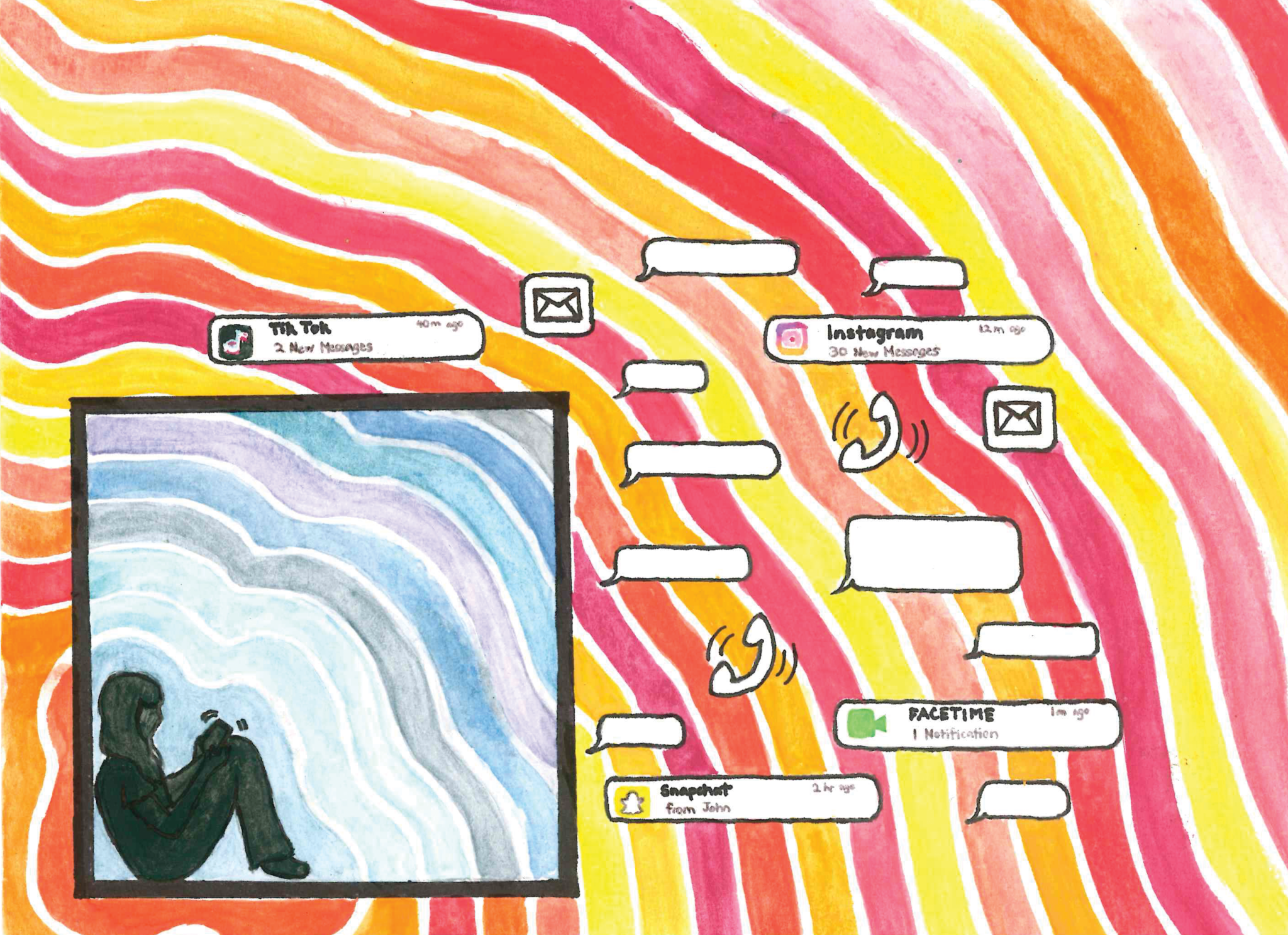 Simone Mansell / Daily Nexus
Simone Mansell / Daily Nexus
Every now and then, a bleak study comes out, detailing how dependent we’ve become on our technology, which subsequently inspires a new season of “Black Mirror” more absurd and less unrealistic than the last. After two years of intermittent lockdowns and social distancing, the numbers for 2022 are unsurprising, to say the least.
According to TV, streaming and internet expert Trevor Wheelwright, the average American checks their phone 344 times a day — or, in other words, once every four minutes. Within these frequent interactions with our devices, we send texts, make calls, check inboxes, draft emails, scroll socials and update profiles as quickly and conveniently as we breathe.
Between texting, calls, emails and various social media direct messages, communication and intimacy in the 21st century have understandably shifted from the physical to the digital with the help of our handy technology, consequently replacing much of our in-person interactions with on-screen exchanges.
However, despite our smartphones allowing us to be in constant contact with our friends and family, these advancements in digital networking have somehow made us lonelier than ever. The irony of this statement is not lost on me. After all, with all these ways to communicate and connect with friends and strangers alike, the idea that we’re still lonely sounds veritably impossible. Especially when, at any given moment, we’re able to send a text, upload a post or dial a number in the same time it takes to walk up a flight of stairs. Admittedly, I’ve done all of these things while simultaneously watching my online lectures, taking notes, making breakfast and carrying on a decent conversation with my roommate. Companionship in the digital form is practically second nature to us, in tandem with all of our menial, everyday tasks.
In fact, communication in the 21st century almost begs to be done concurrently with two or three other tasks — calling your boyfriend while you’re grocery shopping, texting a classmate while walking to a lecture hall and catching up with your childhood best friend on FaceTime at the same time — because it is so accessible to us nowadays.
Yet, the sheer convenience of communicating — whether that takes form in a five-second phone call or a three-paragraph text — has undeniably played a large part in our loneliness. The easier it becomes to stay connected with our friends, the harder it feels to have a meaningful conversation without accidentally slipping into the passive, perfunctory conversations that we’ve grown accustomed to, thanks to the overwhelming amount of digital communication readily available to us.
Thus, the very reason smartphones are so valued in our society — namely, their ability to quickly connect us to our friends anytime, anywhere — may very well be the same reason why 36% of all Americans feel “serious loneliness.” The oversaturation of communication ironically lends to an alienation of a sort — the kind of alienation that fosters passive friendships rather than active friendships and, subsequently, encourages a lonelier lifestyle.
This isn’t to say that digital conversations (or technology, for that matter) are unequivocally terrible: Social media can be a wholesome way to keep up with friends; those late-night texts with your best friend can end up being the most meaningful conversations of your young adult life; a funny tweet your roommate sends you is enough to make your day better. I, personally, look forward to the sweet comments that my friends leave on my social media posts, and often send out some sort of a “good morning” text to my closest friends to remind them that I’m thinking of them (even if I’ve unabashedly sent it out at noon). In fact, there are so many instances in which I am grateful to use my smartphone and its ability to let me reach out to my friends in different states or countries. And, of course, texting and calling don’t necessarily make the task of having meaningful, affectionate conversations impossible — with the right partner, any conversation (using any sort of medium) can be interesting and worthwhile.
However, the truth is, the more we favor digital intimacy over physical intimacy, the more we keep each other at arms-length (or screens-lengths) apart. And, the more we grow accustomed to this way of living, the more this loneliness will become normalized to our future generations. We will continue to live the way Henry David Thoreau once aptly described nearly 200 years ago: leading “lives of quiet desperation,” despite all of the benefits and possibilities digital communication has opened up for us. We will continue to grow comfortable saying nothing in particular to each other until, perhaps, all we’ll have left is our smartphones and a couple of half-hearted Instagram comments to keep ourselves distracted.
Despite this bleak prediction of our future, there are deceptively simple solutions to this problem. At the root of our loneliness is miscommunication, something that can easily be remedied by communication that is less contingent on the digital and more dependent on the emotionally significant. Whether that’s a thoughtful text or a couple of hours talking by the beachside, these are the actions that might save us from our own dreaded loneliness.
Min Seo Riu believes a long, ornate email a day keeps the loneliness away!
















This is a really insightful and engaging read! Thanks min :-)